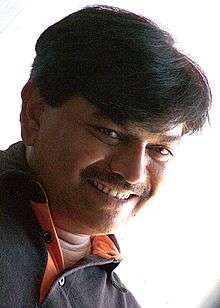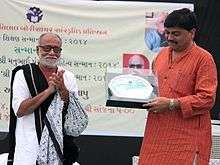Sanju Vala
| Sanju Vala | |
|---|---|
 Sanju Vala | |
| Native name | સંજુ નારણભાઈ વાળા |
| Born |
Sanju Naranbhai Vala 11 July 1960 Badhada, Savarkundla, (Amreli), Gujarat |
| Occupation | Poet, Critic |
| Language | Gujarati |
| Nationality | India |
| Notable works |
|
| Notable awards |
|
| Years active | Since 1983 |
|
| |
| Signature |
 |

Sanju Vala (Gujarati: સંજુ વાળા) is a Gujarati language poet and critic of the postmodern era from Gujarat, India. He has also worked as a columnist for numerous newspapers, such as Janmbhumi and Phoolchhab. His many creation published in various literary magazines, such as Shabdsrusthti, Parab, Samipe, Etad, Parivesh, Navneet Samarpan and Gazalvishw. As a poet, He has organised and was part of countless mushairas, kavi-sammelan and lectures on poem appreciation and criticism His most significant contributions have been in Gujarati poetry but he has also written articles of poem appreciation and criticism. He authored more than 10 books and received numerous literary awards.[1]
Early life
Sanju Vala was born on 11 July 1960, in Badhada (Savarkundla) village in Amreli district of Gujarat, to Naranbhai and Ranima. He completed his primary education from Badhada primary School in 1976. He completed std.-10 in 1977 and std.-12 in 1979 from J.V Modi Highschool, Savarkundla. He could attended only first year of college education and than left the college.[2]
Career
Sanju Vala joined revenue department of Gujarat government in 1979 and still working there. He has served as a member in working committee of Gujarati sahitya parishad from 2012 to 2014. He is also member in working committee of Vali Gujarati Gazalkendra run by Gujarat sahitya akadami.[2]
Works
Vala started his career with writing ghazals and later ventured into other forms of poetry. His main contribution is towards Geet, ghazals and Achhandas (free verse poetry). He successfully attempted in creating poetry with fresh style of writing distinguishing the well-established style of writing. Harish Minashru and Manilal H. Patel appreciated his style of rhythm by commenting that his songs are path-breaking and fresh between age-old pattern of rhythm. At that time when most of the ghazal-poets used to write in straightforward and loud tones he wrote against flow of predominant style of writing ghazals and established poetry with fresh language. [3]
Recognition
Sanju Wala seeks awareness of the multiple states of consciousness through multiple verse forms. He is adept at the lyrical and has a flair for Gazals. His songs reflect saurashtra diction. He experiments with meters like Kataav that are flexible or with free verse. He can be flippant while retaining a sharp eye to notice minute and missed details of everyday life. Oppressive pain and explosive violence in several of his poems are inevitable on a journey to the centre of existence. We were born during the years of hope and aspirations. Sanju was born in 1960 during the period of national frustrations. But the future of Gujarati poetry rests in the poets like him.
Dileep Jhaveri (A Tale of Modern Gujarati Poetry, Muse India, Issue 11)[4]
He was awarded the Jayant Pathak Poetry Award award for his anthology 'kaik/kashunk/athava to' in 1990. For his contribution in Gujarati ghazal poetry, he was awarded by Shayda Award in 1999. He received R.V Pathak/Nanalal Kavita Paritoshik in 2003 and Dr.Bhanuprasad Pandya Award for his anthology 'Ragadhinam' in 2007 by Gujarati Sahitya Parishad, Darshak Sahitya Sanman-2014 by Vidhyaguru ratilal borisagar sanskrutik pratishthan, Kavishree Ramesh Parekh Sanman-2014 by asmita foundation, Rajkot and Harindra Dave Memorial Award in 2014.[2]
Published books
- Kaik/Kashunk/Athava To... (collection of poems), 1990
- Atikrami Te Gazal (gazals of poets from Rajkot), 1990
- Kinshukalay (Compilation of ghazals of new generation)
- Killebandhi (long poem and Freeverse), 2000
- Ragadhinam (poem-songs), 2007
- Ghar same sarovar (Collected poetry of shyam sadhu), 2009, Published by Gujarat Sahitya Akademi.
- Kavitachayan-2007 (Selected Gujarati poems of 2007) published by Gujarati Sahitya Parishad.
- Yaadno Rajyabhishek (Selected gazals of Shoonya Palanpuri), 2012, published by Gujarat Sahitya Akademi.
- Manpanchamna Melama (Collected poetry of Ramesh Parekh), 2013, published by Gujarat Sahitya Akademi.
- Kavita name sanjeevani (collection of gazals) 2014.[2]
References
- ↑ Brahmbhatt, Prasad (2012), Arvachin gujarati sahityano itihas (History of modern gujarati literature) parshv publication
- 1 2 3 4 Shukla, Kirit (2013). Gujarati Sahityakar Kosh. Gandhinagar: Gujarati Sahitya Akadami. p. 439. ISBN 9789383317028.
- ↑ Chavda, Anil; Brahmbhatt, Harsh, eds. (2013). Shabda Sathe Maro Sambandh. Ahmedabad: Navbharat Sahitya Mandiar. p. 182-191. ISBN 978-81-8440-754-9.>
- ↑ Jhaveri, Dileep (2016-01-21). "A Tale of Modern Gujarati Poetry". Muse India. Retrieved 2016-01-21.